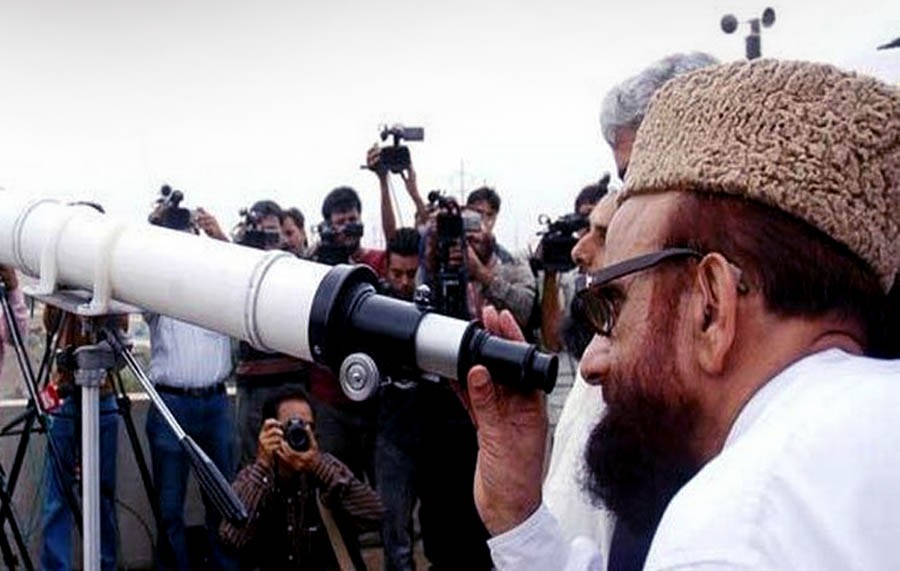
Sometimes they see it, and sometimes they don’t. The Ramzan chaand remains elusive

Will they see it or will they not? Is tomorrow going to be the start of the Holy month or not? Is it Eid tomorrow, yes or no?
For most of my adult life, I, and millions of other Pakistanis, have been unwilling participants in the annual circus known as moon sighting. We wait, with tainted breath, and sometimes empty stomachs, till a handful of pious men throng rooftops across the major cities of the country, in search of the elusive crescent.
Sometimes they see it, and sometimes they don’t.
And then there’s Mufti Shahabuddin Popalzai, from the Qasim Khan Mosque in Peshawar. He is to Mufti Muneeb-ur-Rehman and the Ruet-e-Hilal committee, what Gaul was to Rome -- impregnable, unwilling to submit.
This year, it seems, the outcast may have been right. When the crescent was clear to see, throughout most of Khyber Pakhtunkhwa and Fata, the Ruet-e-Hilal committee decided that it was the eyes deceiving the mind, and refused to acknowledge the numerous shahadats its zonal office in Peshawar received.
According to a news report carried by The News, by the time the shahadats from Peshawar reached the zonal committee, they had already ended their meeting after declaring that the Ramzan moon had not been sighted. One must ask the central committee then, how it could have made the announcement when one of its prominent offices had not sent in its findings.
At the same time, the KP government should take up the matter with the central committee as well, because in either case, there’s a black sheep in the family.
In any case, Popalzai went ahead and announced the beginning of Ramzan. And us lot, that follows the state sanctioned Ruet-e-Hilal committee, followed suit a day later.
As the world moves forward, in science and technology, Pakistan continues to be stuck in a moment in time, a long long time ago. Where science can predict, to remarkable accuracy, the dates when the crescent will appear, the Ruet-e-Hilal committee continues to insist on the archaic method of physical evidence -- gotta see it to believe it.
The jury is hung on what the Islamic injunctions are -- whether physical sighting is indeed, a prophetic necessity. And much of the Muslim world is equally divided on the matter.
But something in clearly wrong, if the entire Muslim world celebrates Eid on three to four successive days, as has happened in the past. While it has been scientifically proven that there is no location on earth that has not entered the new lunar month within 24 hours.
To counter this, the Turks had a grand idea -- a unified Islamic calendar. And for this, they convened the ‘International Hijri Calendar Union Congress’. The Saudis had had a similar idea in the 1970s, when they created the Ummul-Qura, according to which, the Ramzan moon is sighted on the 29th of Sha’baan.
In any case, the outcome of the Turkish conference was clear: "In this day and age, when people can travel to the moon and observe the movements of the sun and moon second by second, in this age of major scientific developments, it is wrong to disregard these developments and insist on observing the new moon with the naked eye by climbing up mountains."
Clear as a crescent.
The congress included scholars and astronomers from Saudi Arabia, Qatar, and the United Arab Emirates, amongst others. The congress’ decision is to be referred to the Organisation of Islamic Countries (OIC), for official adoption across the Muslim world.
Judging by the historical track record of the OIC, the chances of this happening are zero.
Is a unified date for Eid even necessary? The Head of the Ruet-e-Hilal committee, the exalted Mufti Muneeb-ur-Rehman doesn’t think so. "This is only a problem with the Pakistani media only -- even in the United States, some people started the Holy month on Friday and some on Saturday. This is fine," he says. "Those who saw the moon started on Saturday, those who based it on calculations, started on Friday -- these are unimportant matters on which I don’t speak."
Is the exalted Mufti saying that unity amongst the believers an unimportant matter? Surely I am mistaken.
Going by the different dates for the start of Ramzan, the ensuing Eids, and the last day of the Islamic calendar, it makes sense the 8th of Zil Haj should also be different. This day marks the start of the Haj pilgrimage as well. Somehow, the discrepancies of the preceding months correct themselves by the time Haj comes around. But because this announcement comes from Mecca (figuratively), all follow suit.
Just to put this issue in context: Saudi Arabia announced that the first roza would be on Saturday, May 27. Indonesia, same. India, same. Iraq, same. Afghanistan, same. Iran, same. Pakistan, Sunday.
In an Islamic community torn by sect, politics and power, it would make sense to, at the very least, have some show of unity -- the least Pakistan can do, like a majority of the world, is follow suit with Riyadh. Like we do on so many other matters.